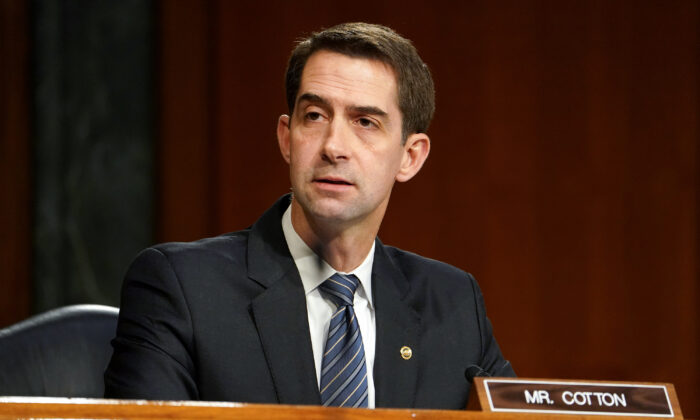
Rep. Tom Cotton Introduces Legislation to Ban ‘Critical Race Theory’ in US Military
Arkansas Sen. Tom Cotton has introduced new legislation that seeks to ban “critical race theory” training within the United States military.
If passed, the bill (pdf) introduced on Thursday would prohibit U.S. Armed Forces and educational institutions operated or controlled by the Department of Defense from promoting such “racist theories.”
The legislation comes amid reports that U.S. Navy officials advised personnel to read books by authors Robin DiAngelo and Ibram X. Kendi claiming white people are inherently racist.
“Our military’s strength depends on the unity of our troops and the knowledge that America is a noble nation worth fighting for,” the Republican senator said in a press release.
“Critical Race Theory teaches that race is a person’s most important characteristic and that America is an evil, oppressive place,” he said. “That idea may be fashionable in left-wing circles and college classrooms, but it has no place in our military.
“Not only will such racist ideas undermine our troops’ faith in each other, they’ll also erode their trust in our country’s guiding principles. The United States military shouldn’t be promoting such divisive, un-American ideas,” he added.
Supporters of the Marxist theory say it’s necessary to fight against “systemic racism,” which they claim is prevalent in all of America’s institutions.
The senator’s legislation, called the “Combatting Racist Training in the Military Act of 2021” would specifically ban ideas claiming the United States is “a fundamentally racist nation” and that “certain races are fundamentally oppressive or oppressed.”
The move comes after the Chief of Naval Operations Adm. Michael Gilday released the latest version of the Professional Reading Program (CNO-PRP) on Feb. 23, which provides a regularly updated list of recommended books as part of the Navy’s effort to help develop the professionalism of all sailors.
The admiral’s list includes books that are overtly political, namely “How to Be an Antiracist” by Ibram X. Kendi, “Sexual Minorities and Politics: An Introduction” by Jason Pierceson, and “The New Jim Crow” by Michelle Alexander.
“These works fall under the rubric of critical race theory, a racial form of Marxist philosophy which should not be allowed to poison our military,” Reps. Doug Lamborn (R-Colo.) and Vicky Hartzler (R-Mo.) wrote in a March 11 letter obtained by Fox News.
Cotton’s bill also noted that the founding principles and belief of the United States is “enshrined in the Declaration of Independence,” that all humans are created equal and endowed by their Creator with “certain unalienable Rights.”
“The United States’ commitment to the equal dignity and natural rights of all mankind is the strongest possible defense against racism and oppression of all kinds,” the senator wrote in the bill, adding that U.S. Armed Forces should not promote or otherwise encourage anti-American and racist theories that demoralize and divide its members while undermining its mission to “bear truth, faith and allegiance” to the Constitution.
GQ Pan contributed to this report.
Rep. Tom Cotton Introduces Legislation to Ban ‘Critical Race Theory’ in US Military
From The StatesMan
Would the Rev. Dr. Martin Luther King Jr. recognize the civil rights movement of today —92 years after his birth, and more than 57 years after his famous “I Have a Dream” speech?
I don’t believe he would. The just goals he fought for, equal opportunity for all and a color-blind society, have been set aside by modern critical race theorists, in favor of divisive identity politics and collective grievance.
The logical outcome of these progressive policies won’t be the world King dreamed of — where “the sons of former slaves and the sons of former slave owners will be able to sit down together at the table of brotherhood.”
It will instead be a dystopia not far removed from the reality that so deeply disappointed King, with segregation that is at once educational, societal and economic.
Let me explain.
King’s calls were for integration and justice. Separate was never equal, he knew. He also knew that integration wouldn’t be easy. “Segregation is a cancer in the body politic which must be removed before our moral and democratic health can be realized,” he said in a speech at SMU in 1966.




